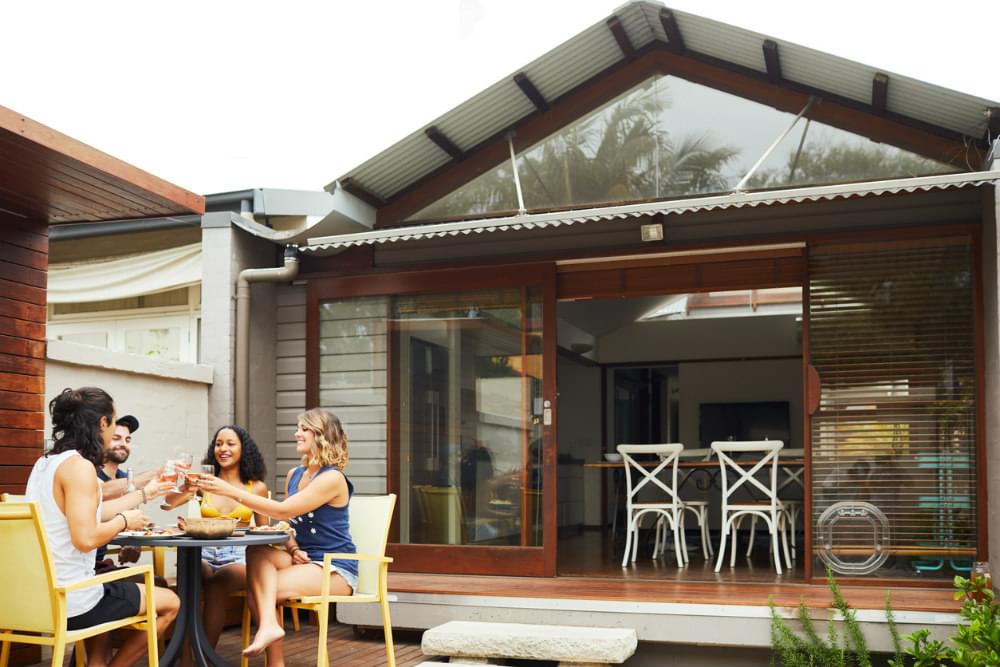Property co-ownership: the good, the bad and the legalities

Have you been priced out of the property market or don't quite have enough for a deposit to qualify for a home loan?
Co-ownership has been touted as a solution to both these scenarios - but is it really a viable option to getting your leg on the property ladder or is it just another investment scam?
Also known as fractional property investment, property crowdfunding and property co-vesting - the theory is that you can acquire a portion of a property, without all the expenses - including the initial deposit that lenders typically require.
Thanks to the property boom and relative unaffordability of property in Australia, many people - particularly first home buyers - simply cannot afford to buy a home. Consider that in September 2018, only 0.9% of Sydney suburbs had a median value less than $500,000.
Co-ownership is one approach to help solve the housing affordability problem, and has recently become a real trend - with Domain reporting that 8 in 10 new mortgages are being taken out by more than one party.
But how does co-vesting work, and what are the pros and cons of this approach to property investment?
"Property co-ownership is also known as fractional property investment, property crowdfunding and property co-vesting"
What’s involved in property co-ownership?

There are a number of ways you can co-own property today.
The most obvious route is to join forces with family or friends to make the dream of property ownership a reality.
There are also online platforms which match you with other investors, so you co-own a property with anyone - including virtual strangers, with the option to live in the property or rent it out as an investment. This is called fractional property investment, and there are a number of local players in this space including BrickX and Kohab.
How to co-own properties with friends & family
The best way to make a success of a co-vesting arrangement with family and friends is to determine what you want to achieve before you commit to anything.
Talk through all the scenarios that could arise and make sure you are all on the same page with regard to your investment timeframes and objectives. Then make sure you are protected by a written legal agreement if circumstances change.
Like any financial commitment you should research co-vesting to see if it makes sense for your circumstances and investment objectives.
Read: Ultimate beginner's guide to property investment strategy
How does fractional property investment work?
Fractional property platforms work in slightly different ways. As an example, BrickX divides a property into 10,000 'bricks' or units, with demand determining what you pay for a unit.
In terms of fees, the company takes a 1.75% transaction fee and there are also deductions for property management costs which they take care of. You earn rental income in proportion to how many units you own, and capital returns based on the property price when it comes time to sell your units.
" You earn rental income in proportion to how many units you own, and capital returns based on the property price when it comes time to sell your units."
Is co-ownership the future of property investment? The jury is still out as fractional property investment platforms have not been around long enough to pass judgement on. An obvious question is what happens to your investment if there is a property downturn? Could your money have performed better elsewhere?
Given the niche nature of the investment, there will also be a limited market of investors who will want to buy your units when it comes time to sell. These are all factors you should consider before parting with your hard earned cash.
But just like fractional investing, there are also pros and cons to investing with friends and family.
Pros & cons of buying property with family and friends

Consider these pros and cons before you make a commitment to co-own with friends or family, so you're fully aware if it's right for you.
The obvious pros to co-vesting include:
- You can break into the property market with a co-ownership agreement
- No need to save up for a full deposit. So if a home loan provider requires a deposit of 20 per cent, you only need to save up for half of this - assuming you are co-vesting with one other friend or family member. Practically speaking, this could be $8,000 instead of $16,000 on a mortgage of $800,000. This reduces further if there are more co-vesters.
- Pay a deposit of 20 per cent or more and you avoid paying Lenders' Mortgage Insurance - which is a further saving.
- You also reduce the other initial costs of a property purchase including stamp duty, and legal fees.
- Ongoing costs are also shared - specifically if you are renovating, and also for maintenance, rates and taxes.
- You - and your partners - will also repay a mortgage off quicker as you are able to pool your resources.
Co-vesting can help you break into the property market with no need to save up for a full deposit.
Now let’s take a look at the downsides or cons of co-vesting in property with friends or family.
People's circumstances can change, and not everyone may want to hold a property for the long term - which is the best way to accumulate wealth. If you, your friend or family member wants to sell up it could put the ownership of the property in doubt - especially if you can't buy them out.
Without a legally binding agreement, you could have no legal recourse if you and your partners disagree or fall out. Don't assume that you will always agree or have the same investment objectives - even if they are your flesh and blood or a very close friend. They could get married, lose their job or even die - all scenarios that could put your investment at risk.
Like any other investment, the property market is not guaranteed to provide a return, so you could lose money on your co-owned property.
Be aware that banks will record the full loan taken out against your name - not just your share. This could limit your ability to borrow for another investment.
As a co-owner, you are liable for any debt incurred by your partners if they use the property as security for the mortgage. This means that if anyone defaults, everyone’s credit rating will be impacted.
Most common co-ownership disputes

There are variety of disputes that can crop up in a co-vesting arrangement. These can be disagreements over:
- When to sell the property
- If you should refinance
- If a partner can be bought out
- Who is responsible for costs - like maintenance and rates - associated with the property
- Repayments to your home loan
- This is why it is essential to have a legal agreement that covers co-ownership and all the potential scenarios that could crop up.
Read: Best time to sell a house
The legalities of co-ownership
When you buy a property with other people, you are entering a legal relationship.
The most common legal document that covers co-vesting is a co-ownership agreement. This sets out the rights and obligations of each person with a share in the property and can help you avoid costly legal bills if a dispute arises. A co-ownership agreement should cover:
- How mortgage repayments are made, and by who
- Who can live at the property
- Who is responsible for maintenance
- What happens in the event of a partner wanting to sell, or if they default or die
Without a co-ownership agreement you could become involved in costly litigation to work out a solution. This should be drafted by a legal professional such as a solicitor.






